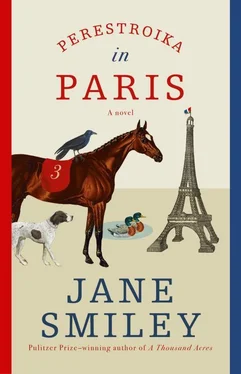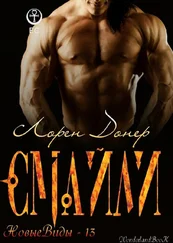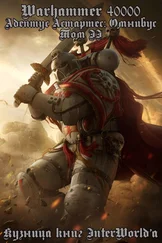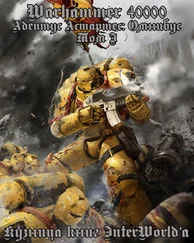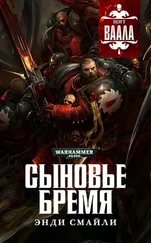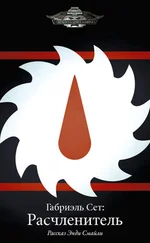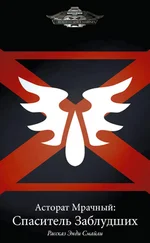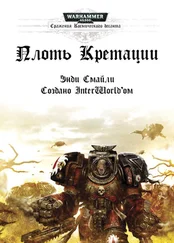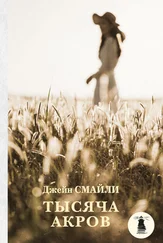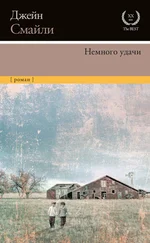As a dog who paid attention to humans and was also prone to dejection, Frida could see through the window of the grand salon that Christmas was not making Étienne happy, that Étienne would sit beside Paras, his arm across her shoulder, as if he was dejected. Frida knew “dejected” very well. Once in a while, he would lay his cheek against Paras’s coat, and if he was not sad, well, Frida didn’t know sadness.
As a bird dog, Frida also understood the concept of offerings. Above and beyond food were sticks, balls, pinecones, abandoned shoes, inedible dead songbirds—all of which she’d carried to Jacques at one time or another. In return, he had bought her the occasional stuffed toy, knowing she liked to rip the toy open and pull out the fluff, and the occasional rock, because Frida had enjoyed carrying rocks in her mouth on walks. Offerings, she understood, pleased the recipient in some strange way that had nothing to do with food. Staring at Étienne, she felt that an offering might do him good. A rat was a possibility—she occasionally smelled a rat when she put her nose to the base of the door, but she was not going to go into the house just to kill a rat. She went to the purse (which was now stored in a basement window well) and took out one of the white bills. She chewed it a little so that it wadded up, then tucked it into her cheek. She crawled through the hole beneath the fence, careful about emerging—she waited until no humans were around, then shook herself and trotted with her customary flair to Jérôme’s shop. She knew that Jérôme now thought she belonged to Madame de Mornay and Étienne. Perhaps she did.
But she did not want apples or onions or carrots or bread. That was food. She wanted an offering. How a dog might choose an offering was a mystery, but there were plenty of windows to look into, and perhaps there was some shopkeeper or another who would take her money.
The task was more difficult than she had expected. Most of the shops around Jérôme’s were cafés, bread shops, or pastry shops. Beyond Jérôme’s, she was out of her territory, so the best she could do was keep moving and looking. If she seemed idle, a gendarme was sure to notice. In some stretches, she found no shops at all, only buildings that humans entered and came out of. As she trotted lightly along, she tried to remember what Jacques had enjoyed—his guitar, of course, but that seemed impractical. Books, but according to Raoul and Paras both, Étienne had plenty of those. Items of apparel—Jacques had a very soft and sheepy-smelling scarf that he enjoyed wearing on cold days, and occasionally wrapped around Frida—that was a possibility. A bag to carry, a blanket to sit on. She had seen plenty of humans carrying electronic devices (small, glittering, hard things). Étienne didn’t have one, but Frida felt, realistically, that that sort of thing was beyond her. Several dogs passed her, and not only small dogs—a wolfish male who was even larger than she was gave her the eyeball, but he was wearing a quite tasteless spotted coat, and when he saw Frida staring, he put his head down and slunk along in the shadow of his human. A very friendly, curly-coated medium-sized dog with a waving, happy tail also greeted her, but when the owner stopped and looked both ways, Frida trotted on without responding to the greeting. The friendliest owners of the friendliest dogs were the most likely to call in the gendarmes. Perhaps she should find a shop that sold these harnesses and leashes that the other dogs were wearing. Such a thing would be easy to carry to Étienne. But no. A leash could lead to other things, like going into the house and having Étienne lock the door.
It seemed to Frida that she trotted about for a long time, and it was surely true that if she hadn’t had an excellent nose she would have gotten lost. These streets were complex, with many intersections. Finally, she gave up, and made her way back to Jérôme’s shop, where she sat down beside the entrance, spat out her bill, and put her paw on it. The door opened, and a woman came out with two large sacks. Jérôme followed. He stood over Frida, his hands beneath his apron, and said, “Merry Christmas, my dear. How are you?”
Frida mumbled a few things, and Jérôme laughed. She moved her paw slightly, revealing the bill. Jérôme bent down and picked it up, then smoothed it on his knee. He said, “My God! You must be doing your Christmas shopping!”
Frida gave him her paw and he shook it. He held on to the bill, and invited her into the shop. It was empty of human customers.
The shop was tastefully decorated with a few flowers and ribbons. In addition to the usual squashes and potatoes and beans and oranges, Frida noticed boxes that she hadn’t seen before, hard metal, with busy pictures on them. She touched one with her nose, and Jérôme set it on the counter. Of course there was food inside it, but the offering was the picture—humans liked pictures. Jérôme pointed to what smelled like bread, but was circular and covered with treats and decorations. Frida whined. Jérôme put it on the counter. There was another box, one she could see through, and in that one were elaborate cookies of many shapes. Since Jacques had had a sweet tooth, Frida had tasted a cookie or two, though she didn’t like them. She nosed the box of cookies. Jérôme put it on the counter. One more thing, she thought. Jérôme touched a bag of nuts (she was familiar with nuts, because Jacques had sometimes eaten them). Attached to the bag was a tiny humanlike figure with big teeth, wearing a black hat. Frida put her paw over her eye and lowered her head. No sale. Jérôme laughed. After a moment, he placed the offerings in a heavy bag, also with pictures, and made Frida’s change. He put the change in the bag, too. There was not much of it.
The bag of offerings was a good deal heavier than the purse, but Jérôme placed it carefully in her jaws, and then she squared her shoulders and headed back to the boy’s house. Frida was reminded of a time when she and Jacques were working in the Jardins du Trocadéro. A stray terrier had kept pestering Jacques to throw a small stick. Jacques threw it a few times, then hid it. The terrier ran off, and reappeared minutes later with a rake—gripping it between her teeth, right in the middle of the handle, and balancing it as she carried it to Jacques. She dropped it in front of him, and barked, “Throw it! Throw it!” Jacques had laughed to himself for the rest of the day. Frida had had to admit that she was impressed. So now she thought of the terrier and carried her heavy bag down the street. At the very last minute, though, she saw another possibility. A shop door opened, and inside there was a bin full of balls. The door closed. She sat and waited, assembling her dignity, and when the door opened again, she looked into the face of the human who opened it as he was leaving the shop. He smiled and held the door for her. She went inside and over to the bin of balls, where she set down her bag.
The human who now slouched toward her was the type of human she usually avoided—scowl on his face, sour fragrance, lank hair on his head—the type who might give a dog a kick if he thought no one was looking. Before he even got to her, he was saying, “Get out of here, you mutt! No dogs allowed!” Frida retained her dignity, gave him a level look, and placed her paw carefully on the bin, beside one of the balls. Then she nosed her bag. The human stopped with his legs apart, waved one arm, then put his hands on his hips. Frida knew right then that he was afraid of her. Well, some humans were afraid of dogs. She did what she had to do—lay down, rolled over, and then rolled back over the other way. The human took a deep breath. Frida rolled onto her stomach and crawled toward him. Then she waited. Finally, the human reached out his trembling hand, patted her lightly on the head. She waited. He patted her again, this time with more confidence. He smiled. Frida stood up slowly, turned, and went back to the bin, where she put her paw next to the same ball. He came over and took the ball out of the bin, then stepped back and tossed it to her. She jumped up and caught it. She carried it to the human’s very large feet and dropped it. He picked it up, tossed it gently down the aisle, toward the back of the store. Frida ran after it and carried it to him, waiting until he opened his hand before she placed it on his palm (Jacques had been very particular about fetching). The human stared at her, tossing the ball back and forth between his hands, then walked away. Frida sighed, and went to her heavy bag. She took the handles of the bag between her teeth, picked up the bag, staggered slightly, then balanced herself.
Читать дальше
